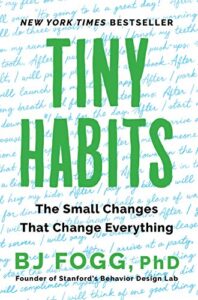To be successful, it’s imperative that you have lofty expectations and set at least one big, audacious goal. Having such a goal can be overwhelming. It begs the question, how do you go about achieving it?
The simple answer is that it’s like eating an elephant. It’s too big to eat all at once. It needs to be broken down into smaller pieces. You have to do it one small bite at a time. Still, it requires a process. That’s where Tiny Habits: The Small Changes That Change Everything by BJ Fogg can help.
BJ Fogg is a behavioral scientist who runs the Behavior Design Lab at Stanford University. His research has shown that changing behaviors and achieving goals requires one to start small, with tiny habits. Succeeding at one tiny habit allows one to layer in additional habits until the desired behavior changes take hold and goals are achieved.
To prove his point he shares numerous anecdotal stories showing how people have used his techniques to transform their lives, including how he has used it himself. For example, in his desire to become more fit and eat better, he goes through how he started with a tiny habit – doing two push-ups after every time he went to the bathroom. From there, once he started seeing results from this habit, he was able to layer in additional habits to create larger behavioral changes that led to his goal of living a healthier lifestyle.
At its base level, Fogg breaks down his process of incorporating (tiny) habits into your daily routine using the following formula:
A – Identify an existing routine, such as brushing your teeth, that you do regularly. This event is your Anchor moment that reminds you to do the new behavior.
B – Do a simple version of the new Behavior you want to incorporate into your life, such as doing two push-ups, immediately after the anchor moment.
C – Do a Celebration immediately after you perform the behavior to reinforce and hard-wire the activity into your brain. As a behavioral researcher and neuroscientist, Fogg has shown through his research that positive emotions resulting from performing an activity cause us to want to do that activity more.
Fogg covers a lot more ground in the book building off his ‘ABC’ formula. I’m not going to document it here since I could go on for pages. Let’s just say I made a lot of notes and highlights while reading the book that I need to review so I can start incorporating his tools and techniques to build new habits into my daily routine.
Bear in mind that to get the most out of Tiny Habits, you need to have established a mindset that you are open, ready, and willing to change your existing behaviors. As such, I wouldn’t call it a foundational book for personal development. You should have read books such as 7 Habits of Highly Effective People, The Power of Positive Thinking, Mindset, or other books from my Personal Development Jump-Start list. Tiny Habits gives you the tools to build on top of the foundation laid by these books.
Bottom line, Tiny Habits is a Must Read if you’ve bought into the concept of accepting responsibility and taking control of your life. It won’t necessarily help you with identifying and setting your goals, but it will give you the tools you need to achieve them.

